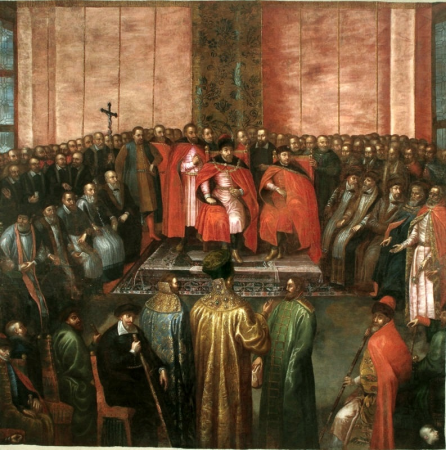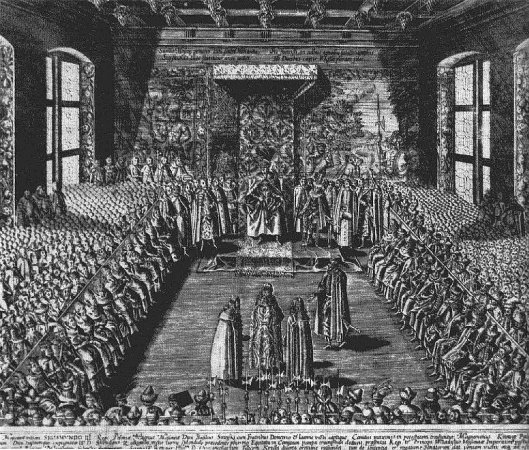Extraordinary Sejms
Convening of extraordinary assemblies in the Polish Commonwealth was provided for in the Henrician Articles of 1573-1576. In case of an emergency, the king was authorized to convene an extraordinary session. An extraordinary Sejm was convened above and beyond the usual rule of mandatory convocation of an ordinary Sejm, which was to be held every two years at the latest. An extraordinary Sejm, however, was not like any other Sejm. It differed from the ordinary sessions, such as the confederation, convocation, election, limited and pacification assemblies, which were gatherings of a special nature with specific tasks and objectives. Unlike ordinary assemblies, which were convened at specific intervals as a responsibility of the monarch and which had their own convening procedure, the extraordinary assemblies could be convened in an accelerated manner at any time, provided there was an urgent need. It was up to the monarch to assess whether such a need was indeed present. The procedure of convening extraordinary assemblies provided for a period of time for the holding of the pre-session assemblies shortened to four or even two weeks from the date of promulgation in a royal universal. The duration of meetings of the extraordinary assemblies was reduced to two weeks (exceptionally to three weeks). Its extension required a unanimous decision of all the delegates present at the meeting. The royal universals, which announced the convening of an extraordinary session, had the aim to eliminate from the deliberations activities which could delay the speedy deliberations of the parliament (e.g. reading the convention's pacts, applying for vacancies, senators’ opinions, ceremonies of greeting and farewell). Moreover, the extraordinary assemblies were to deliberate only on the issues which were announced in the universals, legations, and the Chancellor's proposals from the throne. Most often, these were issues related to the threat to the state and the need to secure financial resources for defence. The subject matter of the sessions of the extraordinary assemblies was also specified in the parliamentary constitutions authorising the king to convene extraordinary assemblies. The extraordinary assemblies had to be unanimous. The liberum veto principle applied. The deliberations could be extended to cover matters not provided for in the royal universals. During the period of existence of the Polish Commonwealth, 22 extraordinary assemblies were convened, of which only 8 resulted in the adoption of constitutions. 11 extraordinary assemblies were forced to an end. One of them was not held in 1693 due to the illness of King John III, and the Sejm of 1733 was interrupted with the death of King August II.
See: E. Opaliński, Sejm srebrnego wieku 1587-1652. Między głosowaniem większościowym a liberum veto, Warszawa 2001; W. Czapliński, Sejm w latach 1587-1696, in: Historia sejmu polskiego, vol. 1, Warszawa 1984, edited by J. Michalski, p. 217-299; H. Olszewski, Sejm Rzeczypospolitej epoki oligarchii (1652-1763). Prawo-praktyka-teoria-programy, Poznań 1966; J. Michalski, Sejm w czasach saskich, in: Historia sejmu polskiego, vol. 1, Warszawa 1984, edited by J. Michalski, p. 300-349; P. Paradowski, W obliczu „nagłych potrzeb” Rzeczypospolitej. Sejmy ekstraordynaryjne za panowania Władysława IV Wazy, Toruń 2005; I. Malec-Lewandowska, Sejm walny koronny Rzeczypospolitej i jego dorobek ustawodawczy. 1587-1632, Kraków 2009.



